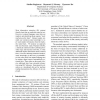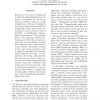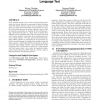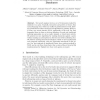150
click to vote
AAAI
2012
13 years 4 months ago
2012
Relation extraction, the process of converting natural language text into structured knowledge, is increasingly important. Most successful techniques use supervised machine learni...
137
click to vote
ACL
2012
13 years 4 months ago
2012
Most information extraction (IE) systems identify facts that are explicitly stated in text. However, in natural language, some facts are implicit, and identifying them requires â€...
128
click to vote
ACL
2011
14 years 5 months ago
2011
Information extraction (IE) holds the promise of generating a large-scale knowledge base from the Web’s natural language text. Knowledge-based weak supervision, using structured...
111
click to vote
COLING
2010
14 years 9 months ago
2010
Humans are very good at judging the strength of relationships between two terms, a task which, if it can be automated, would be useful in a range of applications. Systems attempti...
128
click to vote
CIKM
2010
Springer
15 years 8 days ago
2010
Springer
Many existing indexes on text work at the document granularity and are not effective in answering the class of queries where the desired answer is only a term or a phrase. In this...
113
click to vote
ACL
2010
15 years 8 days ago
2010
Many researchers are trying to use information extraction (IE) to create large-scale knowledge bases from natural language text on the Web. However, the primary approach (supervis...
124
click to vote
FUIN
2006
15 years 2 months ago
2006
We consider approximate pattern matching in natural language text. We use the words of the text as the alphabet, instead of the characters as in traditional string matching approac...
112
click to vote
ESA
2010
Springer
15 years 3 months ago
2010
Springer
Text search engines return a set of k documents ranked by similarity to a query. Typically, documents and queries are drawn from natural language text, which can readily be partiti...
130
click to vote
COLING
1990
15 years 3 months ago
1990
We consider the problem of extracting specified types of information from natural language text. To properly analyze the text, we wish to apply semantic (selectional) constraints ...
134
click to vote
NAACL
1994
15 years 3 months ago
1994
Acquisition of semantic information is necessary for proper understanding of natural language text. Such information is often domain-speclfic in nature and must be acquized from t...




